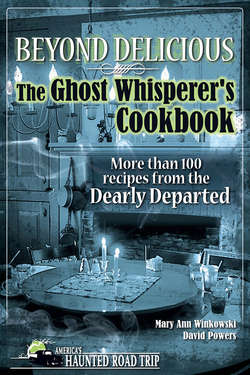Читать книгу Beyond Delicious: The Ghost Whisperer's Cookbook - Mary Ann Winkowski - Страница 23
На сайте Литреса книга снята с продажи.
STUFFED KOHLRABI
ОглавлениеMY BOHEMIAN GRANDFATHER used to grow kohlrabi, also known as German turnip (even though it’s actually a type of cabbage). I remember going out into his garden and picking it fresh, then we’d clean it, salt it, and eat it raw. I thought it was delicious, and because that was how my grandfather always served it, I never thought of cooking it. Furthermore, I never thought of stuffing it with meat and cooking it—but that changed when I met Hannah.
Hannah was Emma’s mother, and she’d been dead about six years. Emma lived in rural Ohio in a place known locally as the Dumpling Valley. She was Amish, and her friend, Sharon, who was not Amish, had called me for her.
“It’s terrible for them,” Sharon told me on the phone. “You have to come out.”
“Does Emma know you’ve called me?” I asked before we got too far in the conversation. I’d done some work with the Amish before, and as in many devoutly religious communities, someone who could see and talk to ghosts wasn’t always welcome.
Sharon assured me that Emma knew about the call, but she agreed that I should time my trip so that her husband and older sons wouldn’t be around. Sharon explained how she would watch the chickens in the yard sometimes and it looked just like they were being chased—the birds hopping and flapping about as if being kicked at. The animals in the barn would become similarly spooked, and inside, the lanterns they used would just go out for no reason.
“And these aren’t like our lanterns,” Sharon assured me. “This is their only light after dark because they don’t have electricity. These lanterns are designed to never go out unless you put them out.” She went to tell me that things would go missing and whole rows of sewing would be unraveled, almost as they watched. Not to mention that the kids—all eight of them—were constantly getting sick.
“And they also say they’ve seen their grandmother,” she concluded.
“Grandma’s dead?” I assumed.
“Yes,” Sharon agreed. “And she was … well, she was the queen of the family, for lack of a better word. She was harsh and rigid and very traditional. She always said Emma married the wrong man.”
When I got to the house, Hannah was there, and she was everything I’d been told and more. I could tell by the way she was eyeing me that she didn’t like me. I almost got the sense that she didn’t believe I could see and talk to her—just as she probably would have been when she was alive. But, of course, I could see and talk to her, and I did.
“Are you upset about something?” I asked pleasantly.
“She married the wrong man,” Hannah spat back. “If she’d married who I’d wanted her to marry—who we said she’d marry—she’d be living on a farm twice this size!” Aaron, Emma’s husband, was Amish, but he did a lot of woodworking for the non-Amish, and that upset Hannah. I suppose you could say they still had arranged marriages, but nowhere near as strict as we might think. Suffice it to say, Hannah had plans for her daughter that did not include Aaron, but Emma had decided to marry who she wanted to, not who she was told to.
That wasn’t all that had Hannah upset, though. She also spent several minutes cutting down Emma’s garden, her cooking, her sewing, and just about everything else the poor woman did. She was especially annoyed that Emma was not growing kohlrabi.
“She wants to know why you’re not growing kohlrabi,” I summed up diplomatically.
“Why would I?” Emma retorted. “I always hated kohlrabi, so why would I grow it? And I don’t like Brussels sprouts or cabbage, so I won’t grow those either!”
“That’s because she won’t stuff it!” her mother replied in a clipped tone, and I suddenly got what this was about. This was about a recipe Hannah was particularly proud of that Emma refused to make.
“Did your mother stuff kohlrabi?” I asked Emma.
She made a gagging sound and nodded. “Yes. She stuffed it with crayfish! I hate crayfish, too!”
I looked at Hannah. “If she says she’ll make that recipe for the kids to try, will you cross over?”
She didn’t answer. “You’re not doing any good here, you know. You’re making the kids sick, scaring the animals—”
“I know that!”
“And I don’t think you’re going to break up their marriage—”
“I don’t want to break up their marriage,” she snapped. “I just want her to know she did it wrong.”
“I think she knows how you feel. So why don’t you give me the recipe and then cross over?”
She opened her mouth to snap at me again, then shut it and sighed and finally said, “All right. I’ll go. But she has to make my stuffed kohlrabi!” She huffed again, then added, “And she doesn’t have to use crayfish if she doesn’t want to—it’s just as good without.”
Stuffed Kohlrabi
6–8 kohlrabi
½ pound beef or pork
½ white roll, moistened in milk and mashed
1 small onion, minced and lightly browned
1 whole egg, lightly beaten
Salt and pepper
Sugar to taste
1 tablespoon butter
1 tablespoon flour
Peel kohlrabi carefully and cut into halves lengthwise; scoop out centers with potato scoop. Put meat through meat grinder and combine with roll, onion, egg, and seasoning. Stuff kohlrabi with meat mixture, and arrange in shallow water. Add salt and a little sugar to water, and add the scooped-out kohlrabi pieces to cook with the rest. Cook tightly covered so that the kohlrabi will steam. When tender (about 30 minutes), brown butter, add flour, and stir, adding a little of the cooking liquid, until thoroughly blended.
